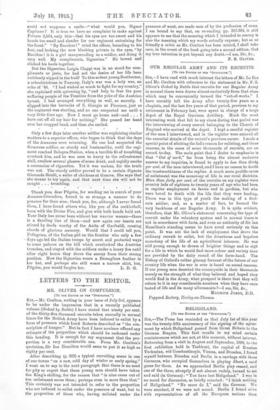HELIG OLAND.
[To THE EDITOR Or THE "SPECTATOR."] Sra,—The Press has reminded us that July 1st of this year was the twenty-fifth anniversary of the signing of the agree- ment by which Heligoland passed from Great Britain to the German Empire. This fact recalls to my mind certain reminiscences which are not, at this moment, without interest. Returning from a visit in August and September, 1890, to the first exhibition held in Tashkent, the capital of Russian Turkestan, yid Constantinople, 'Vienna, and Dresden, I found myself between Dresden and Berlin in a carriage with three Germans, who occupied themselves in playing &cart, a card game for three. As we approached Berlin play ceased, and one of the three, abruptly if not almost rudely, turned to we and said (in German) : "You have lost Heligoland." I was in no mood for discussion, so briefly retorted : "I think nothing of Heligoland." "No more do I," said the German. We were succinct, if we were not sound. Berlin I found alive with representatives of all the European nations then panting and scheming for the partition of Africa. The hoardings were plastered with the portrait of Major von Wissmann, the "Man of the Hour," to which he laughingly drew my attention as I drove with him one day I I had been of some assistance to his commercial advisor in East Africa, Eugen Wolf, when the latter, very gravely ill, came to India. This was my introduction to the German East African circle. King Leopold was in Berlin representing the Belgian Congo, and Major (now Sir Claude) Macdonald was one of those who represented England. Eugen Wolf, a man of enterprise and ability, whom I again met in 1838 at Tientsin on his return from travel in the interior of China, and who subsequently figured in Count Zeppelin's earliest airship trials at Lake Constance, was staying, as I was, at the Kaiserhof, and with him I had frequent conversations. Undoubtedly his mind was biassed by the not unnatural pride which he, as von Wissmann's right-hand man, took in the acquisition of the vast German East African territory. What rests impressed on my mind is the tone of indignation with which he exclaimed: "We have given you five hundred thousand square miles of East African territory for that little bit of a rock, Heligoland I" I have lost touch with Herr Eugen Wolf, but I venture to think that his patriotic spirit will realize now that Heligoland was worth those five hundred thousand square miles. The devotee of Shari is also doubtless converted by this time.—I am, Sir, &c.,



































 Previous page
Previous page